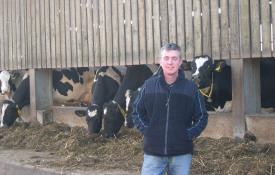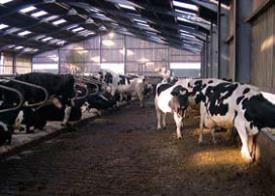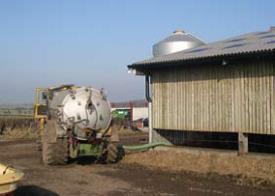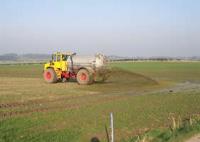
Name: Neville Kitching
Region: Ingleby Cross, North Yorkshire
Farm: Dairy and livestock
Size: 80 hectares
Background:
Summerfield Farm has been farmed by the Kitching family for three generations. The farm consists of 80ha in a single block at Ingleby Cross in the northern tip of Yorkshire. The land is relatively flat with gentle gradients and the soil type is relatively slow draining Dunkeswick series heavy loam and clays. The main enterprise is a dairy unit with 95 Holstein cows and 42 followers. There is also a beef unit with 20 beef animals and 50 calves, and a flock of 140 Dorset and Suffolk cross ewes which are early lambed in November/December. The milking herd is kept in a slurry-based cubicle system, while the young stock and sheep are housed on straw. There is capacity for 1,400m3 of slurry, which equates to about 4 months storage.

The whole farm is in the Entry Level Stewardship (ELS) Scheme. Its key features are 34ha of ridge and furrow pasture, a mixed grazing regime, 5ha of low nitrogen input hay meadow and 3ha of rush meadow. The farmer previously used the Catchment Sensitive Farming Initiative as a source of environmental advice.
What does your nutrient management plan consist of?
Currently, the farm has a nutrient management plan to support the ELS Scheme. The farm applied 8 tonnes of ammonium nitrate (34.5 per cent N) and 25 tonnes of Nitro Chalk (21 per cent N) during the previous year at a total cost of £4,426.
The organic manure produced by the farms 200 or so cattle and 140 sheep has a significant nutrient content. Based on fertiliser prices at the time, the overall value of the manure as a fertiliser was £4,722/year.

No manures or slurries are brought onto the farm.
What other factors affect your nutrient decisions?
The farms rolling annual application limits to comply with the NVZ Regulations and the Code of Good Agricultural Practice (CoGAP) are 81m3/ha dairy slurry (6 per cent dry matter) and 42.5 tonnes/ha cattle farmyard manure (FYM).
The farmer is the only full-time worker on the farm, with no other staff apart from an occasional relief milker. Contractors are used for silage, slurry and harvesting operations.
What are the benefits?
Summerfield Farm achieves a considerable saving by applying the organic manures produced by its stock. At the time of writing, these manures had a value of around £4,770. The use of contractors with sophisticated equipment to spread the manures in an accurate and timely manner is particularly effective.

Applying fertiliser during the coming year at the rates recommended by PLANET would cost considerably more than in the previous 12 months. However, the costs are not just for one year as the recommendations include dressings on lime, phosphate and potash to raise the soil indices that will give benefits over several years.